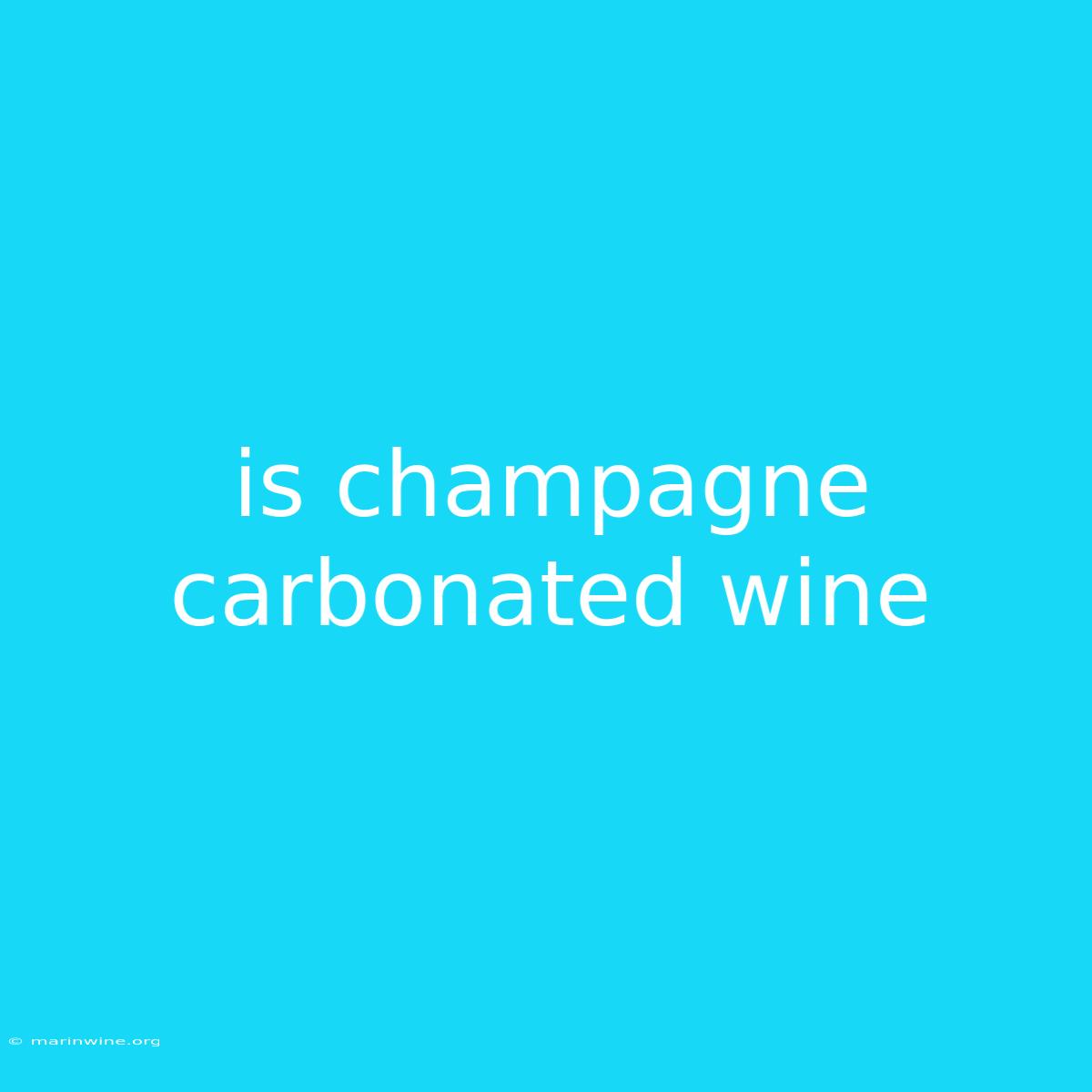Is Champagne Carbonated Wine? Uncorking the Truth About Bubbles
Have you ever wondered what makes Champagne so special? Is it just carbonated wine? The answer is a resounding no! While Champagne does contain carbon dioxide bubbles, it's a much more complex and intricate process that sets it apart from your average sparkling wine.
Why This Matters: Understanding the unique characteristics of Champagne can elevate your enjoyment of this iconic beverage. Knowing the difference between Champagne and other sparkling wines allows you to make informed choices and appreciate the craftsmanship behind this luxurious drink.
Key Takeaways of Champagne:
| Feature | Description |
|---|---|
| Production Region: | Exclusively from the Champagne region of France. |
| Grape Varieties: | Primarily Chardonnay, Pinot Noir, and Pinot Meunier. |
| Second Fermentation: | Undergoes a second fermentation in the bottle, creating the signature bubbles. |
| Aging: | Matured for a minimum of 15 months on lees (yeast sediment) before disgorging. |
Champagne: More Than Just Bubbles
Introduction: Champagne's unique characteristics stem from a combination of factors, not just the presence of carbon dioxide.
Key Aspects:
- The "Méthode Champenoise": This traditional production method is the defining factor of Champagne. It involves a second fermentation in the bottle, where sugar and yeast are added to create the bubbles.
- Aging on Lees: The wine spends time resting on the yeast sediment, contributing complexity and depth of flavor.
- Disgorgement: After aging, the yeast sediment is removed in a process called disgorgement, creating a clean and bright finish.
The "Méthode Champenoise":
Introduction: This method, also known as the "traditional method," is what sets Champagne apart.
Facets:
- Second Fermentation: Unlike other sparkling wines, Champagne undergoes a second fermentation in the bottle. This process creates the bubbles by converting sugar into carbon dioxide.
- Unique Flavors: The second fermentation contributes to Champagne's characteristic yeasty, toasty, and complex aromas.
- Aging: The time spent on lees (yeast sediment) during aging further enhances the wine's flavor profile.
Aging on Lees:
Introduction: The time spent aging on lees is crucial to Champagne's development.
Facets:
- Complexity and Depth: The contact with the yeast sediment adds complexity, depth, and roundness to the wine.
- Autolysis: As the yeast cells break down, they release compounds contributing to Champagne's unique flavors.
- Creaminess and Texture: The presence of lees adds a creamy texture and mouthfeel to the wine.
Disgorgement:
Introduction: This process, crucial in Champagne production, removes the yeast sediment after aging.
Facets:
- Clarity and Brightness: Disgorgement results in a clean, bright, and pristine wine.
- Removal of Sediment: The sediment is carefully removed, leaving the wine clear and ready for consumption.
- Preservation of Flavor: The process ensures the delicate aromas and flavors developed during aging are preserved.
Information Table:
| Feature | Champagne | Sparkling Wine |
|---|---|---|
| Production Region | Exclusively Champagne, France | Various regions worldwide |
| Production Method | "Méthode Champenoise" (Traditional Method) | Various methods, including Charmat |
| Grape Varieties | Chardonnay, Pinot Noir, Pinot Meunier | Variety of grapes depending on the region and style |
| Second Fermentation | In the bottle | Often in a tank |
| Aging on Lees | Required | Not always, and for shorter periods |
| Disgorgement | Required | Not always |
FAQ for Champagne:
Introduction: Here are some frequently asked questions about Champagne.
Questions:
- Q: Is all sparkling wine Champagne? A: No, only sparkling wine produced in the Champagne region of France using the "Méthode Champenoise" can be called Champagne.
- Q: Why is Champagne so expensive? A: The high quality, limited production, and demanding production methods contribute to the price.
- Q: How do I choose a good Champagne? A: Look for bottles from reputable producers, consider the style (Brut, Blanc de Blancs, etc.), and read reviews.
- Q: What is the best way to serve Champagne? A: Chill it to between 45°F and 50°F (7°C to 10°C).
- Q: Can Champagne go bad? A: Properly stored Champagne can last for years, but its freshness and flavor may diminish over time.
- Q: How long can I keep an opened bottle of Champagne? A: An opened bottle of Champagne will stay fresh for about 2-3 days in the refrigerator.
Summary: Understanding these frequently asked questions about Champagne can help you make informed choices and enjoy this fine beverage.
Tips by Champagne:
Introduction: Here are some tips for enjoying and serving Champagne.
Tips:
- Choose the Right Glass: Use a flute or coupe glass to best appreciate the bubbles and aromas.
- Chill Properly: Champagne should be chilled to between 45°F and 50°F (7°C to 10°C) before serving.
- Pour Gently: Pour the Champagne slowly to avoid disturbing the bubbles.
- Pair with Food: Champagne pairs well with a variety of dishes, including seafood, chicken, and cheese.
- Enjoy Responsibly: Always consume alcohol in moderation and enjoy responsibly.
Summary: These tips will help you enhance your Champagne experience and appreciate its complex flavors.
Summary by Champagne:
Champagne is more than just carbonated wine. It's a symbol of celebration and luxury, crafted with meticulous attention to detail. From the unique "Méthode Champenoise" production method to the long aging process on lees, Champagne offers a complex and refined drinking experience. Remember, the next time you raise a glass of Champagne, appreciate the effort and tradition that went into creating this iconic beverage.
Closing Message: The next time you see a bottle of Champagne, remember the story behind the bubbles. It's a testament to dedication and tradition, a celebration of excellence, and a drink that truly deserves to be enjoyed.

